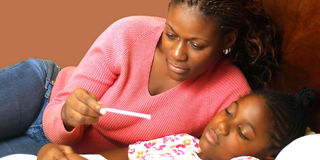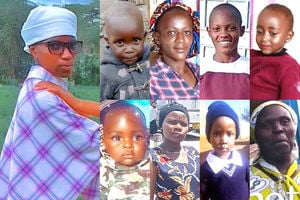Tips for worried parents as Covid affects more children

Parents, guardians and caregivers have been wondering how to protect immunocompromised children amid Covid-19.
Whenever Vicky Chepkoech heard the news of Covid-19 deaths, she would panic. Hearing that children were also dying from the coronavirus, made matters worse.
What worried Chepkoech, a 31-year-old mother of three from Eldoret County, was her child. “Fear gripped me because of my daughter, Quinter, who had a kidney transplant on May 27, 2016 at the age of seen in India. How was I going to handle it given this pandemic intensified the degree of our usual uncharted waters?” She poses.
Quinter was diagnosed with Chronic Kidney Disease at the age of five after countless visits to different hospitals. Chepkoech says the doctor recommended a kidney transplant as an emergency treatment to save her life. “The diagnosis on its own was a shocker. Worse, kids her age on dialysis were dying,” she says.
Little emphasis
Parents, guardians and caregivers have been wondering how to protect children like Quinter who are immunocompromised.
“Immunocompromised means the body’s immunity is down. This may be broadly due to pre-existing medical conditions like HIV, diabetes, high blood pressure and organ transplant cases. These conditions have different causative factor, but in the event such a person contacts Covid-19, the impact is lethal in contrast to ‘healthy’ counterparts,.” says Dr Samrat Shah, a consultant physician at Mediheal Hospital, Nairobi.
Unfortunately, the immunocompromised lack the ability to fight diseases thanks to the drugs they take, which lower their immunity.
Additionally, health experts concur that due to insufficient data on paediatric coronavirus because of higher prevalence in adults, there is little emphasis on safe ways to mitigate the pandemic for the extra-vulnerable children.
One of the ways to address this gap, according to Dr Shah, is to allow kids to be part of the solution. Basics around hand-washing with soap, not touching your face and social distancing, mean that children can be part of the solution.
For parents and caregivers, he adds, they should listen more than talk. The disease has brought about profound psychological impacts. “Find out what the children know and start from there. Without a doubt, this is their biggest event. However, misinformation can cause depression which may lead to hospitalisation then exposure to the virus,” says Dr Shah.
Use of telemedicine
The internal medicine specialist also advises parents and caregivers to continue regular treatment plans and scheduled appointments to put in check the children’s health. “If possible, adopt telehealth services and have their blood samples and medication taken and delivered at home respectively. For patients in low-income dwellings, plan to visit health centres when less populated,” says the doctor.
Another way to help children cope with this period is to create corona-free time. Dr Shah adds: “Ensure Covid-19 does not dominate every conversation in your home. Listen to music, sing, play games with them. Children are wired for play. Engaging them if parents are at home will cool off the need to go outside.”
For suckling, immunocompromised children with Covid-19 positive mothers, breast milk is key. He, however, advises mothers to consider expressing the milk. “Alternatively, continue breastfeeding, but take extreme measures, lest they too get exposed to the virus from their mother,” he says.
Psychological turmoil is one of the issues observed. “Lately, the counselling sessions have been low, but the few cases I have handled especially of children are heart-wrenching. Sadly, many have chosen to suffer in silence,” says Cheryl Mwangi, a counselling psychologist.


